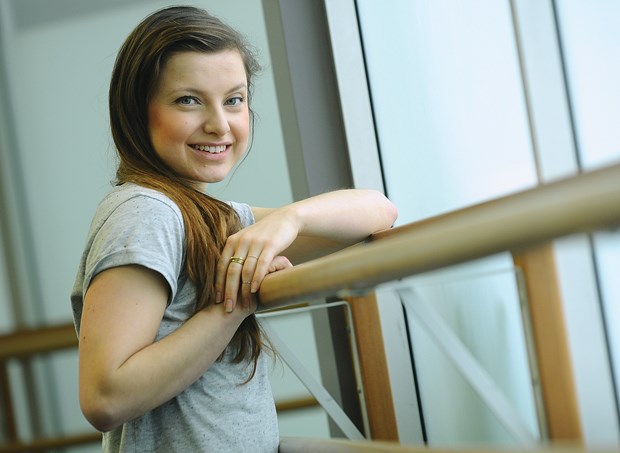Dances for a Small Stage, Ukrainian Centre, 154 East 10th Ave (between Main & Quebec), Feb. 14 and 15 at 8 p.m. For more information visit movent.ca.
She danced for the first time when she was three years old.
Since then, Lexi Vajda has left two decades worth of pointe prints on stages and studios across the North Shore.
The North Vancouver native is currently preparing her semi-solo performance at the 30th instalment of Dances For a Small Stage.
An actor playing L. Frank Baum's Tin Woodman (presumably before he met Dorothy and learned he had a heart all along) is slated to emcee the Valentine's Daythemed affair.
For Vajda, it's the next logical step in a career that began the first time she saw her dress spin as she twirled on a rec centre dance floor.
"I started with ballet and then when I was about six or seven I started to branch out into other styles," she says.
She tried jazz, hip hop and tap, ultimately finding the greatest affinity for contemporary dance.
During the last days of childhood, the time when many people watch their dreams fade from the confines of cubicles and factories, Vajda was determined music and movement would remain a part of her life.
"When I finished high school I wasn't sure where dance was going to take me but I knew I wanted to continue," she says.
She eventually encountered dancer/choreographers Tiffany Tregarthen and David Raymond, who were spearheading a training program and a new dance company in Vancouver. That duo ultimately formed Out Innerspace, whose stated ambitions are reminiscent of Rod Serling's monologue from the beginning of The Twilight Zone.
The boundaries of Out Innerspace are those of its imagination, and its choreography seems to exist somewhere between the pit of man's fears and the summit of his knowledge.
"I bit the bullet and started training with them and ever since then I've been totally committed to contemporary dance," Vajda says.
Vajda pendulates between studying dance and teaching at a few studios including the North Shore Academy of Dance.
"It is always a little bit of a balancing (act) but I like that. I feel like my school informs my dance practice and my dance informs my experience in school," she says. "The thing about teaching is that it makes you articulate what you otherwise wouldn't have to articulate so you're breaking down things that when you're just dancing yourself you might not have to."
Vajda's propensity to analyze the minutiae of each movement has put her in good stead with choreographer Karissa Barry.
The two are collaborating on Vajda's performance at Dances for a Small Stage.
She is set to share the stage with musician Dana Szyndrowski, who will be playing a percussive instrument while Vajda dances.
"It's a solo dance but on stage it's really truly a duet," Vajda explains.
The challenge is finding a way to make Szyndrowski's music "synch and interweave" with the choreography, Vajda says.
Finding a means of "artistic agency" inside intricate choreography is important for Vajda.
"I have guidance but I have a lot of freedom to interpret the way I want to," she explains.
That freedom is the difference between painting by numbers and painting.
"It doesn't change the choreography per se, but it changes the essence," Vajda explains.
"As a dancer who hasn't created the movement, there's often a lot of space for interpretation. You can kind of inject your own personal experiences, your own personal situations. I use a lot of my imagination to make movements have more weight or more
context to me.. .. It makes it more a journey for me as a dancer, as opposed to just executing specific moves. It becomes a true experience."
In one movement, Barry's choreography calls for Vajda to grab the back of her head and throw herself forward.
In Vajda's imagination, her body has no weight, requiring every iota of her arm strength to lift her body before it crashes to the ground.
"That sounds crazy to people," she says, laughing.
Despite her focus on technique, Vajda is relatively uninterested in garnering a cerebral reaction from the audience.
"Generally when I dance I want audience members to feel something in their body that they've felt before so I want to access something that is generally and universally human, and I want to pull something out of them that could be a specific feeling, it could be a memory, it could be an emotion," she says. "I would rather that than any type of awe."



